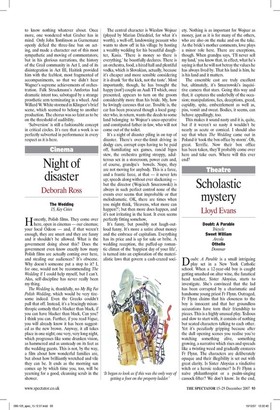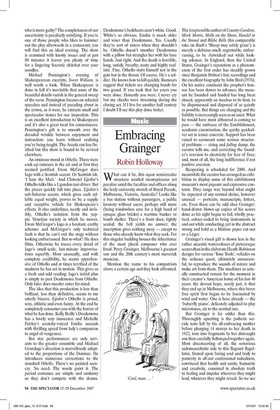Scholastic mystery Lloyd Evans
Doubt: A Parable Tricycle Sweet William Arcola Othello Donmar Doubt: A Parable is a small intriguing play set in a New York Catholic school. When a 12-year-old boy is caught getting smashed on altar wine, the fanatical head teacher, Sister Aloysius, starts to investigate. She's convinced that the lad has been corrupted by a charismatic and handsome young priest Fr Flynn. Outraged, Fr Flynn claims that his closeness to the boy is innocent and that her groundless accusations have torn their friendship to pieces. This is a highly unusual play. Tedious and slow to start with, it consists of nothing but seated characters talking to each other. Yet it's peculiarly gripping because after the dull opening scenes you realise you're watching something alive, something growing, a narrative which rises and spreads like a twisting weed and gradually ensnares Fr Flynn. The characters are deliberately opaque and their illegibility is set out with great clarity. Is Sister Aloysius a vindictive witch or a heroic redeemer? Is Fr Flynn a naïve philanthropist or a psalm-singing cassock-lifter? We don't know. In the end, who is more guilty? The completeness of our uncertainty is peculiarly satisfying. If you're one of those people who likes to hammer out the play afterwards in a restaurant, you will find this an ideal evening. The show is crammed with knotty issues and at just 80 minutes it leaves you plenty of time for a lingering Socratic chitchat over your noodles.
Michael Pennington's evening of Shakespearean excerpts, Sweet William, is well worth a look. When Shakespeare is done in full it's inevitable that some of the beautiful details vanish in the general sweep of the verse. Pennington focuses on selected speeches and instead of parading about in the crown, as it were, he extracts small and spectacular stones for our inspection. This is an excellent introduction to Shakespeare and it's also a great treat for connoisseurs. Pennington's gift is to smooth over the dreaded wrinkle between enjoyment and instruction: you learn without realising you're being taught. The Arcola run has finished but this show is bound to be revived elsewhere.
An ominous mood at Othello. There were cock-up rumours in the air and at first they seemed justified. Ewan McGregor does Iago with a Scottish accent. Or Scottish-ish. 'I hate the Muir.' And Chiwetel Ejiofor's Othello talks like a Ugandan taxi-driver. But the pieces quickly fall into place. Ejiofor's sub-Saharan accent, which gives each syllable equal weight, proves to be a supple and receptive vehicle for Shakespeare's effects. It also underlines, neatly and invisibly, Othello's isolation from the yuppie Venetian society in which he moves. Ewan McGregor's Iago is a hesitant, earthy schemer and McGregor's only technical fault is that he can't exit the stage without looking embarrassed. But so what? He does films. Otherwise he traces every detail of Iago's small-scale, last-minute improvisations superbly. Most unusually, and with complete credibility, he seems apprehensive of Othello and at times terrified of the madness he has set in motion. This gives us a fresh and odd reading: Iago's initial plan is simply to part Desdemona from Othello. Only later does murder enter his mind.
The idea that this production is less than brilliant, less than definitive, seems to me utterly bizarre. Ejiofor's Othello is proud, sexy, athletic and even funny. At the end he completely consumes you with the horror of what he has done. Kelly Reilly's Desdemona has a lovely sexy innocence and Michelle Fairley's scratchy-voiced Emilia ascends with thrilling speed from lady's companion to angel of vengeance.
But star performances are only servants to the greater ensemble and Michael Grandage's direction is marvellously adapted to the proportions of the Donmar. He introduces numerous corrections to the standard Othello. There's no painted scenery. No need. The words paint it. The period costumes are simple and unshowy so they don't compete with the drama.
Desdemona's bedsheets aren't white. Good. White's so obvious. Emilia is much older and wiser than Desdemona. Yes. Usually they're sort of sisters when they shouldn't be. Othello doesn't smother Desdemona with a pillow but strangles her with his bare hands. Just right. And the death is horrible, long, untidy, breathy, nasty and highly realistic. Fine. Othello stabs himself not in the guts but in the throat. Of course. He's a soldier. He knows how to kill quickly. Rumours suggest that tickets are changing hands for two grand. If you took that for yours you were done. Honestly you were. I never cry but my cheeks were streaming during the closing act. If I live for another half century I doubt I'll see this play done better.


































































































 Previous page
Previous page